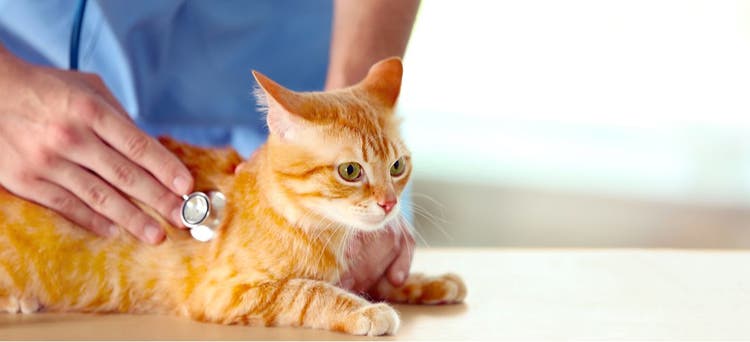
Pectus Excavatum in Dogs and Cats
Pectus excavatum is a congenital deformity of the sternum and ribs, resulting in a narrow chest and depression of the sternum area. Pets with this condition typically like their sternum has been “pushed into” their chest.
In brachycephalic dog breeds (bulldogs, Pugs, Boston Terriers, Shih Tzu), pectus has been associated with other congenital abnormalities, including:
- Thoracic spine deformities
- Tracheal hypoplasia (underdevelopment/narrowing of airway)
- Lateral heart displacement
- “Swimmer’s Syndrome,” which is a deformity causing the legs of puppies or kittens to deviate laterally, preventing them from standing upright and walking forward. In these affected pets, they appear to swim along the ground, which inspired the name.
What Animals Are At-Risk?
Cats are more likely to inherit this congenital condition than dogs. Burmese cats and brachycephalic dog breeds acquire this condition more commonly. Overall, however, this is a fairly uncommon congenital defect.
Is Pectus Excavatum a Serious Condition?
Clinical presentations can range based on the severity of the defect. At minimum, it can just be the abnormal shape of your pet’s chest without any other comorbidities. On occasion, this condition is associated with cardiopulmonary issues, due to decreased thoracic (chest) volume as a result of the depressed sternum.
Depending on the severity of the congenital defect, animals may experience a cough, exercise intolerance, or lethargy accompanying the palpable sternal defect.
Pectus can also be found alongside other congenital abnormalities. If it is found, even if your pet is asymptomatic, they should be seen by a veterinarian to make sure they are otherwise systemically healthy.
What Are Treatment Measures for Pectus Excavatum?
Even though finding this abnormal chest shape on your pet may be very alarming, many cases are found incidentally and do NOT need to be corrected.
If your pet is experiencing severe clinical signs (cardiac dysfunction, difficulty breathing), surgical application of an external splint may be necessary. This is best pursued with a veterinary surgical specialist (DACVS), as this is not a common procedure performed by a general practitioner. The younger the pet is when surgery is performed, the better the outcome, as the bones are more pliable. The splint may need to be left on for 2 – 4 weeks.
Animals with pectus should not be bred, as the possibility to pass this trait on to their offspring is higher than normal. Generally, this defect is mild, though it has the possibility to progress as your pet matures. If your pet has pectus, have them examined by your veterinarian to make sure that they are not having breathing issues.